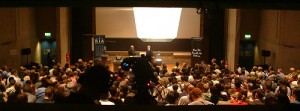 A third Climate Congress will be held on Saturday, March 6, 2010, from 9am to noon, in City Hall. The Climate Congress is open to the public. The main aim will be for delegates to unite on specific recommendations for City action. The Congress will use the opportunity to decide on whether to accept a final report on proposals and to bring the new citizen action teams together.
A third Climate Congress will be held on Saturday, March 6, 2010, from 9am to noon, in City Hall. The Climate Congress is open to the public. The main aim will be for delegates to unite on specific recommendations for City action. The Congress will use the opportunity to decide on whether to accept a final report on proposals and to bring the new citizen action teams together.
During the second Climate Congress, 75 delegates convened to develop recommendations to the city for addressing climate change, but also organize and develop citizen generated solutions. Highlights from the second congress include:
- The Congress discussed priorities among the proposals in the Draft Report. Several common themes emerged and these will be documented in the final report of the Congress.
- Delegates formed action teams to work in specific areas: outreach, resilience, solar and other renewables, process for future climate emergency response (drafting), protection of trees and natural resources, building efficiency, and measurement . Several of these groups have already agreed to meet again. (If you are interested in participating in any of these groups contact Joanna Herlihy <joanna_herlihy@yahoo.com>)
- Recommendations for climate emergency response by the City were considered and received broad support. However, there were questions about the specifics and report structure, that required more time to consider. Those present unanimously agreed to meet again for a third session to address those questions.
For more information about the climate emergency and the Climate Congress visit: http://www.cambridgema.gov/deptann.cfm?story_id=2457&pv=Yes


 As world leaders gathered in Copenhagen,
As world leaders gathered in Copenhagen, 